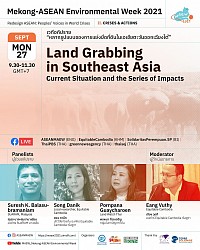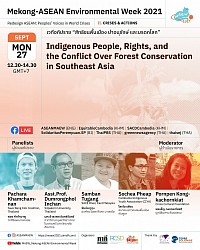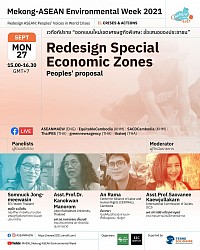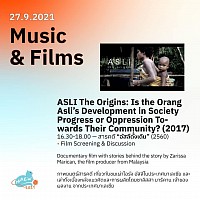27 September 2021
Panel discussion “Land grabbing in Southeast Asia: current situation and the series of impacts.”
27 September, 9.30-11.30 am (Bangkok time)
Organizers: Equitable Cambodia (EC), SUARAM Malaysia, Focus on the Global South
Panelists
- Suresh K. Balasubramaniam, People Before Profit (PBP), SUARAM, Malaysia https://youtu.be/zxkC10bImkc
- Song Danik, Equitable Cambodia https://youtu.be/DFMxBoduiD0
- Pornpana Guaycharoen, Land Watch Thai
Moderator and commentator
Eang Vuthy, Equitable Cambodia
Watch the video of this panel
https://youtu.be/YzD8HNdOdPU
Panel Discussion "Indigenous people, rights, and the conflict over forest conservation in Southeast Asia"
27 September, 12.30 am -14.30 pm (Bangkok time)
Organizers:
Save Bang Kloi Coalition (Thailand), Center for
Ethnic Studies and Development, Chiang Mai University
Panelists
- Pachara Khamchamnan, Save Bang Kloi Coalition, Thailand
- Asst. prof. Dumrongphol Inchan, Etnicity expert, Silpakorn University, Thailand
- Samban Tugang, SAVE River, East Malaysia https://youtu.be/pHb1ZKxxWjE
- Sochea Pheap, Cambodia Indigenous Youth Association (CIYA) https://youtu.be/KW7tIulZN6E
Moderator and commentator Pornpen Kongkachornkiat, Cross Cultural Foundation
Watch the video of this panel
Background
The issue of conflict on ethnicity and forest conservation has been one common issue in Southeast Asia. Recently, the case of Kaeng Krachan Forest, the original home of the Karen ethnic in Phetchaburi Province in central Thailand, has become one of wide interest. The Kaeng Krachan National Part has just been registered as a new natural world heritage site in Thailand on July 26, 2021, following the World Heritage Committee meeting in Fuzhou, China. However, the decision has made amid the cry out of Karen communities who lived in the Kaeng Krachan forest area more than 100 years ago and also against the proposal of the United Nations Human Rights Expert Panel (UNHCR) to postpone the registration and consideration further because Karen people in the area are still being targeted for human rights violations continuously.
An evident of Karen indigenous peoples in the Kaeng Krachan forest lived in the area known as "Jai Pan din" (Heart of the motherland) and "Bang Kloi" for over 100 years was shown in the map of the 1911 Military Cartography Department since the time that the military unit operated near the Burmese border back to 30 years before the first forest law of Thailand enact and 70 years before the Thai government declared Kaeng Krachan National Park.
To eliminate the communities from the forest area, the practice of rotational rice fields has been twisted into destructive shifting cultivation and labeled as a cause of deforestation by the Karen ethnic. They are also accused of drug trafficking and jeopardizing the country’s security. The government agencies claim to evacuate Karen ethnic into areas where they cannot live and face many difficulties. They were deceived and forced to evacuate their homeland, and the operation even burned their homes and barns in the name of forest conservation. Instead of living their simple and happy life in the area, their ancestors lived for a long time, the Karen people of Bang kloi, instead, are now live in poverty and being sued by the government. Their complaints were not taken seriously by the authority.
The epidemic situation of COVID-19 spades out, and the Bang kloi Karen group could no longer work as labor. So, in early 2021, more than 80 Karen people, including older people, women, and children, decided to go back to working in agriculture in their homeland. Eventually, 28 of them were arrested and charged with deforestation, including mothers with young children and some young Karen.
The discussion on human rights violations against the indigenous people, the existence of indigenous peoples that the state has not accepted, and also the complication of the process carrying on by the international groups and process toward the conservation forest by using the case like Bang kloi case in Thailand and also other cases in Southeast Asia was expected in the panel discussion “Indigenous people, rights, and the conflict over forest conservation in Southeast Asia” as one of the panel discussions during the Mekong-ASEAN Environment Week (MAEW) in September 2021.
Panel Discussion "Redesign special economic zones: Proposal and possibilities"
27 September, 15 -16.30 pm (Bangkok time)
Organizers:
EEC Watch Thailand, Land Watch Thai
Panelists
- Somnuck Jongmeewasin, EEC Watch Thailand
- Asst. Prof. Dr. Kanokwan Manorom, Ubon Ratchathani University, Thailand https://youtu.be/rlYobERwC3I
- An Rama, Center for Alliance of Labor and Human Rights (CENTRAL), Cambodia https://youtu.be/7-wK8V4bHrY
Moderator and commentator Asst.Pro. Dr. Saovanee Kaewjullakarn, International Commission of Jurists (ICJ)
Watch the video of this panel https://youtu.be/E7XzVnJgDFo
Background
Special Economic Zones (SEZs) have become a key feature of regional development for several decades now. Presently, communities and people who are affected by the development of SEZs—from losing their land and other living resources and also cultural and economic community strength and cohesion—have also been aggravated by the COVID-19 pandemic situation now ravaging Southeast Asia. The pandemic has made inequality more clearly visible, especially for people who are economically and socially disadvantaged. Amidst the COVID-19 crisis, however, the development of SEZs in the region of government-supported large business investors has continued unabated.
From our experiences of living with SEZs, we, the community networks, and civil society groups think that there is an urgent necessity to ‘redesign’ the thinking and development behind the push for the development of SEZs. As a basic principle, existing problems from current SEZs need to be completely solved first before any more SEZs are established to bring forth new problems. Only by applying this principle can there be a future possible for communities that have to live with SEZs.
Redesigning economic development should start from ideology—to change from the problematic old paradigm of the neoliberal economy to a recovery model that is supportive of the real potential that each area has for its own development. Through the implementation of the Strategic Environmental Assessment (SEA) process, public participation can be better guaranteed with an emphasis on development that is consistent with the identity, resource base, and cultural ecosystem of an area. The complementary economic system focuses on the practical aspects of a decentralized, fair and sustainable way for the community to evolve in a manner that serves both present and future generations. This economic development system has four main components: economic activities in accordance with geography and ecology; economic co-design by all groups and sectors; an economy that can build connections; and the determination of the appropriate placement of the economic development activity and its intended goals, emphasizing the utilization of the existing resource base for the maximum benefit of humanity and the environment altogether.
In the Mekong and Southeast Asia region, many communities are resisting and fighting back against SEZs through collective negotiations and appeals to the state to create economic guarantees, and to maintain if not improve the quality of life for those affected. It is therefore important to hear the opinions of representatives of the various groups if the proposal to ‘redesign SEZs’ above is practical and possible within their own country and context. Panelists—from groups that have been working on SEZs in the region—will present their perspectives on possibilities for alternative economic development after COVID – 19.
ASLI the Origin
16.30-18.00 Documentary film - ASLI The Origins: Is the Orang Asli’s development in society progress or oppression towards their community? (2017) and; The film introduction by Zarissa Marican, the film producer from Malaysia
Moderator Phuthita Dokput, GreenNews
Watch the discussion and the film https://fb.watch/90yt_f1XeQ/
Watch the film https://youtu.be/ExbbOFfsjOc




